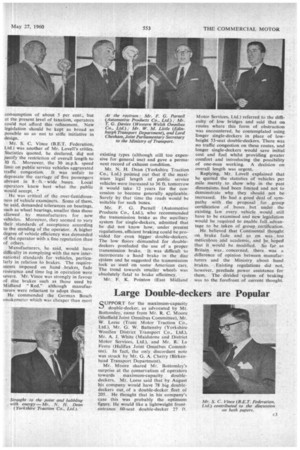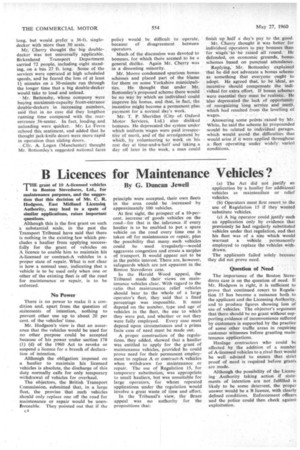Large Double-deckers are Popular
Page 53

Page 54

If you've noticed an error in this article please click here to report it so we can fix it.
QUPPORT for the maximum-capacity double-decker, as advocated by Mr. Bottomley, came from Mr. R. C. Moore (Sheffield Joint Omnibus Committee), Mr. W. Leese (Trent Motor Traction Co., Ltd.), Mr. G. W. Battensby (Yorkshire Woollen District Transport Co., Ltd.), Mr. A. J. White (Maidstone and District Motor Services, Ltd.), and Mr. R. Le Fevre (Halifax Joint Omnibus Committee). In fact, the only discordant note was struck by Mr. G. A. Cherry (Birkenhead Transport Department).
Mr. Moore shared Mr. Rottomley's surprise at the conservatism of operators towards maximum-capacity doubledeckers. Mr. Leese said that by August his company would have 78 big doubledeckers out, of a double-decker fleet of 205. He thought that in his company's case this was probably the optimum figure. He would like a lightweight frontentrance 60-seat double-decker 27 ft. long, but would_ prefer a 36-ft. single decker with more than 50 seats. .
Mr." Cherry thought the -big doubledecker Was not universally applicable. Birkenhead Transport Department carried 72 people, including eight standing, on a bus 27_ ft. long. Some of the services were operated at high scheduled speeds, and he feared the loss of at least 11 minutes on a 30-minute run through the longer time that a big double-decker would take to load and unload.
Mr. Battensby, whose company were buying maximum-capacity front-entrance double-deckers in increasing numbers, said that in no case did they lengthen running time compared with the_ rearentrance 56-seater. In fact, loading and, unloading were quicker. Mr: Le ;Fevre echoed this sentiment, and added that he thought jack-knife doors were more rapid in operation than sliding doors.
A. Logan (Manchester) thought Mr. 'Bottomley's suggested national fareS policy would bc difficult to operate, because of disagreement between operators.
Much of the discussion was devoted to bonuses, for which there seemed to be a general dislike. Again Mr. Cherry was in a dissenting minority.
Mr. Moore condemned spurious bonus schemes and placed part of the blame for them on some Yorkshire municipalities. He thought that under Mr. Bottomley's proposed scheme there would be no way by which an individualcould improve his bonus, and that, in fact, the incentive might become a permanent plus payment for a normal day's work.
Mr. T. P. Sheridan (City of. Oxford Motor. 'Services, ltd.) also disliked bonuses. He deprecated the system under which uniform. wages were paid irrespective of merit, and of the arrangement by whieli, by volunteering to work On his rest day at time-and-a-half and takinga day off later in the week, a man could
finish up half a day's pay to the good.
Mr. Cherry thought it was better for individual operators to pay bonuses than for Wag& to be railed all round. He defended, on economic grounds, bonus schemes based on punctual attendance.
Replying, Mr. Bottomley explained that he did not advocate a bonus scheme as something that everyone ought to adopt. He agreed that, to be ideal, an incentive should compensate the individual for extra effort. If bonus schemes were essential they must be realistic. He 'also deprecated the lack of opportunity of recognizing long service and merit, which had resulted from the levelling of
wages.
Answering some points -raised -by Mr. White, he:said the scheme he propounded woukl be related to individual garages, which would avoid the difficulties that would arise if it were applied throughout fleet operating under widely varied conditions.
















































































































